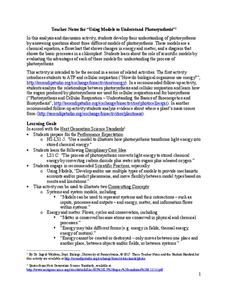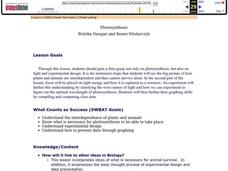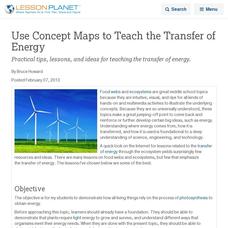Serendip
Using Models to Understand Photosynthesis
Is your class in the dark about photosynthesis? Shed some sunlight on an important biological process with a thoughtful activity. After answering questions to help determine their level of knowledge, learners work with chemical equations...
Scholastic
Study Jams! Photosynthesis
One friend explains to another that plants combine water and carbon dioxide with the energy of the sun to produce sugar and oxygen. She mentions the roles of the roots, chloroplasts, and stomata in an engaging video that reviews how...
Curated OER
Ecosystems and Remote Sensing
Learners obtain remote sensing data to compare and contrast global biomass data with global temperature data.
Curated OER
The Absorption of Solar Energy
Two sequential parts to this lesson introduce your class to the electromagnetic spectrum, the ability to absorb radiant energy, and the pigments in leaves that are responsible for collecting sunlight to be used in the photosynthetic...
Curated OER
Photosynthesis
Students recognize the importance of plants as they perform an experiment involving photosynthesis. Students determine the optimum wavelength of light for photosynthesis by exposing plants to different colors of light, collecting data,...
Curated OER
AP: Chapter 10: Photosynthesis
AP biologists or college-level botanists consider in-depth details of the photosynthetic process. They examine the structures in a leaf and the roles that they play. They label neat and colorful diagrams of photosystems and electron...
Biology Junction
Photosynthesis
Why do leaves change color in autumn? A presentation and worksheet walk through many details of photosynthesis. They explain where photosynthesis occurs, why plants are green, the changing colors in autumn, energy usage, and CAM plants.
Science Matters
Post- Assessment: Transport Systems in Animals and Plants
A little bit of this and a little bit of that. The final lesson of the 21-part unit assesses learners on each animal and plant system. The test covers the basics of each system and focuses on key vocabulary from the unit.
Arbor Day Foundation
Trees are Terrific...Inside and Out!
Trees are the star of a three-step unit celebrating Arbor Day. Step one takes an in-depth look into the structure of a tree, the process of photosynthesis, and the benefits of the leafy giants. Step two challenges scholars to create a...
NOAA
Understanding El Niño Using Data in the Classroom
Are weather troubles caused by El Nino? An installment of a larger series presents a five-part lesson on El Nino. First, scholars learn to read sea surface temperature maps. Then, they compare them to data on graphs before determining if...
Biology Junction
Photosynthesis: Energy and Life
All life requires energy ... and the connection between energy and plant life typically requires photosynthesis. Scholars explore photosynthesis in depth from ATP/ADP through the Calvin cycle. A helpful presentation highlights concepts...
Curriculum Corner
Coniferous and Deciduous Trees
What are the differences between coniferous and deciduous trees? Supplement your tree lessons with a set of activities that has learners describing, naming, comparing, and reading about deciduous and coniferous trees. The activities are...
Polar Trec
Nature's Density Column
Nature provides density columns in the polar regions that provides food for many animals. Young scientists build their own density columns with water in order to answer analysis questions. Through a slideshow presentation, scholars...
New South Wales Department of Education
Photosynthesis
Venus fly traps photosynthesize and consume insects because the soil they live in does not provide enough nutrients. Scholars analyze historical scientific experiments to learn how scientists discovered photosynthesis. From their...
Sunlight Cal-Tech
Chromatography of Plant Pigments
Through a hands-on activity, an acetone-spinach solution is pre-made and learners use this solution to separate the pigments found in spinach using chromatography. The comprehensive resource includes an analysis and conclusion...
American Chemical Society
Isolation of Phytochrome
Why do soybean plants that are planted weeks apart in the spring mature simultaneously in the fall? Four independent activities cover the history of phytochrome research, scientist collaboration, the electromagnetic spectrum, and...
Lincoln Public Schools
Cell Exploration Activities
Engage young biologists in exploring the mysteries of life with this collection of hands-on activities. Enlisting the help of numerous digital resources, students get an up-close look at the structure of plant and animal...
K12 Reader
Plants Are Producers
Here's a handy two-part worksheet that uses an article about plants to assess reading comprehension. After reading the passage, kids answer questions based on the information in the text.
Rain Bird Corporation
Rain Forest Teaching Curriculum
Take young naturalists on an exploration of the world's tropical rainforests with this extensive collection of lessons and activities. Whether its creating leaf and flower prints or investigating the absorption spectrum of...
Curated OER
Name That Leaf
Take a walk through nature with a science experiment about leaves. Third graders use a branching diagram to group attributes of certain kinds of leaves, such as oak, pine, and chestnut. For extra practice, they can collect leaves and...
Curated OER
Case Study of Local Trends in the Carbon Cycle
Students examine the relationship between chlorophyll and carbon dioxide in the atmosphere. In this investigative instructional activity students study the local effects of climate change.
Curated OER
Use Concept Maps to Teach the Transfer of Energy
Practical tips, lessons, and ideas for teaching the transfer of energy.
Curated OER
Raven Chapter 10 Guided Notes: Photosynthesis
Kim B. Foglia has designed a comprehensive series of AP biology worksheets. This one focuses learners on the progression of photosynthesis in plants. In this assignment, they identify structures and steps on high-quality diagrams, use...
Curated OER
Beat a Leaf
A simple, yet effective classroom activity is described in this resource on leaves and how they grow. The activity should lead pupils to discover how plants make their own food and what they need to survive. In the activity, they create...
























